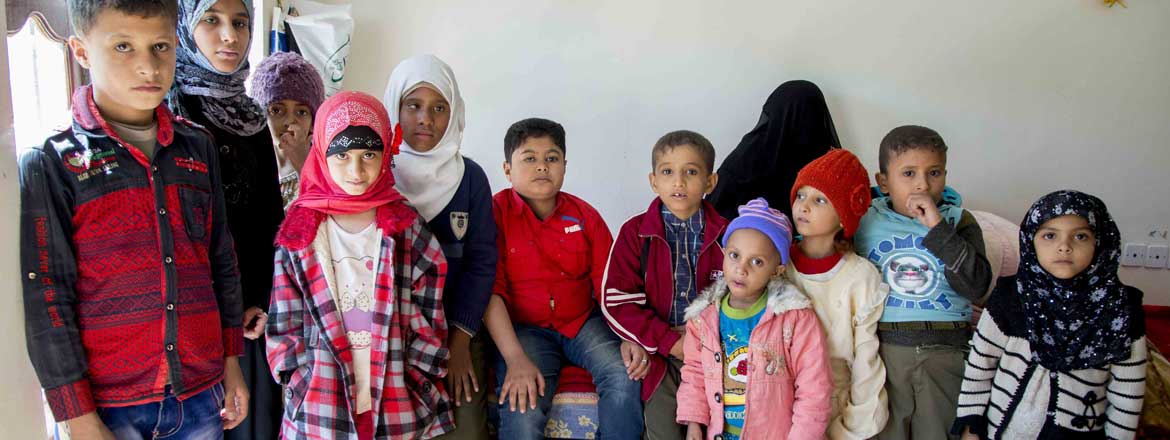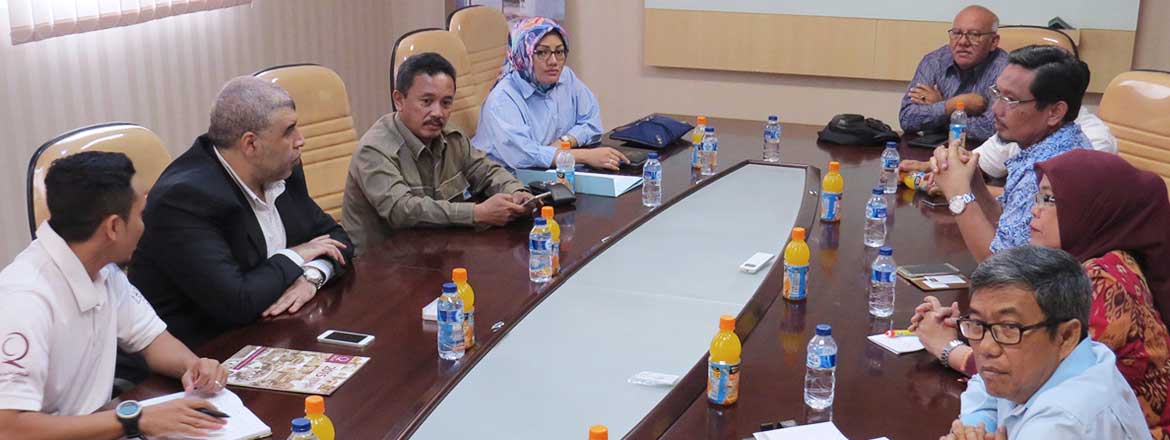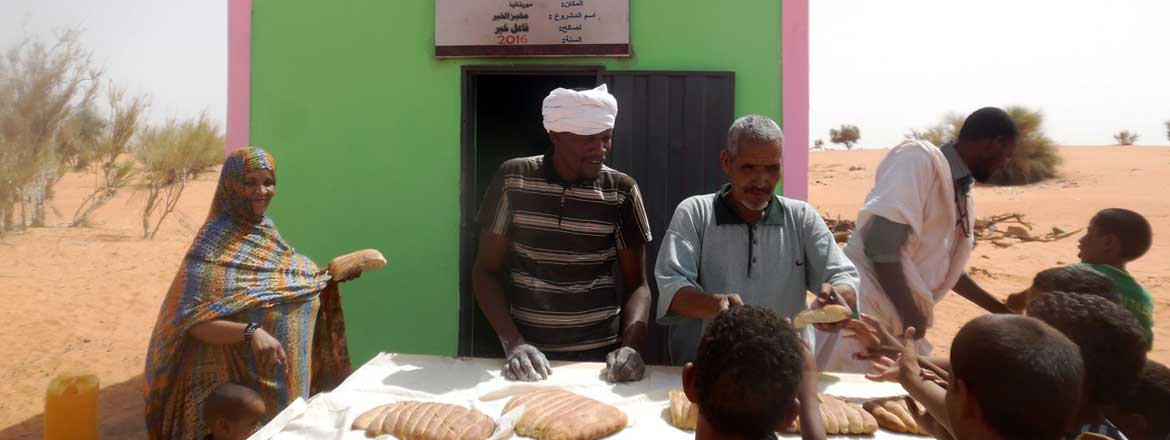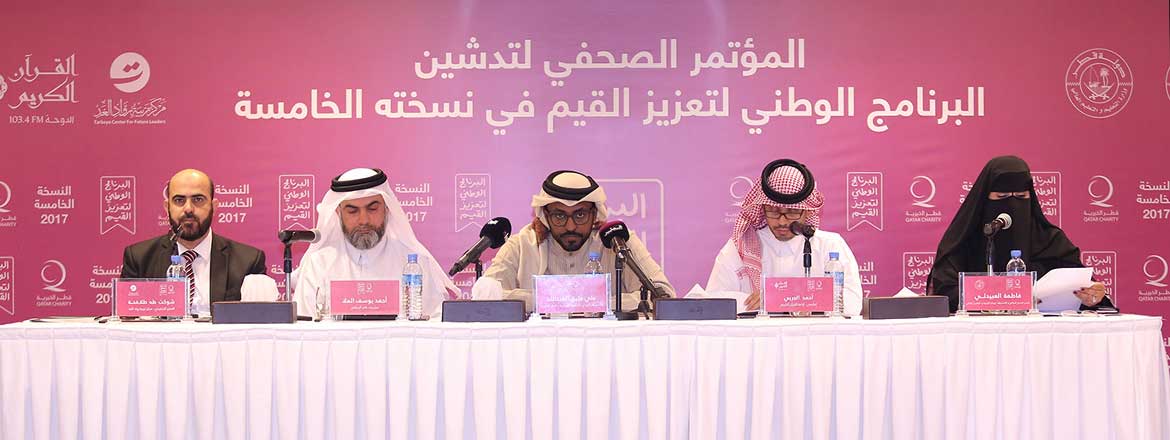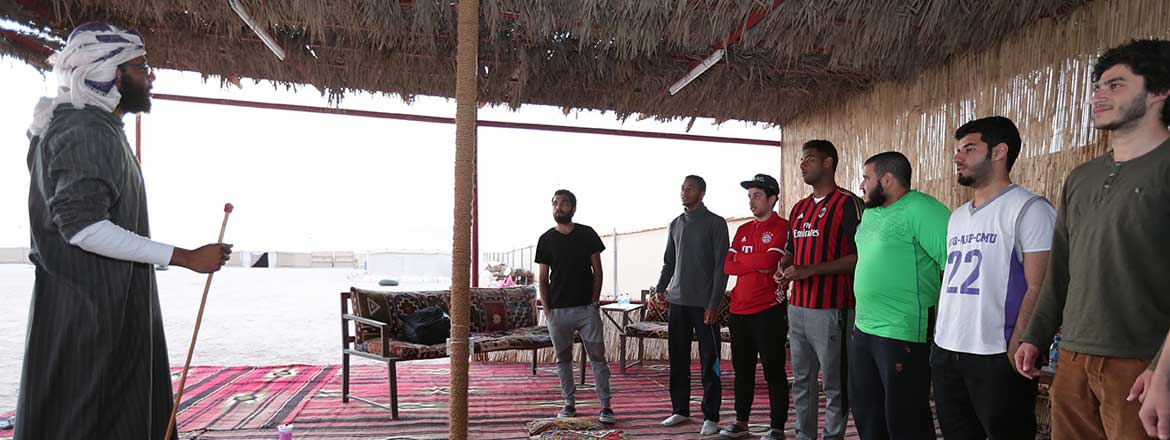A consultative meeting of the civil society network for refugees and displaced people in the region
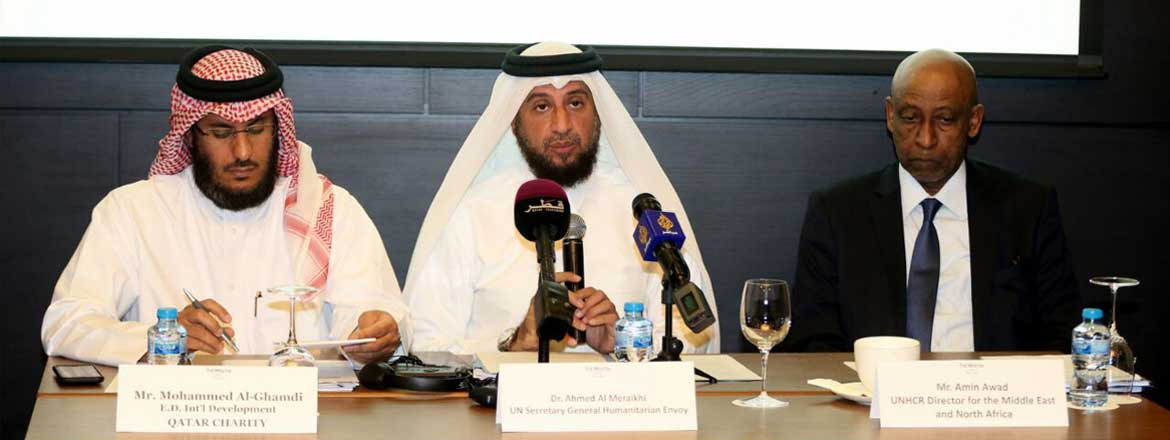
2017-03-06T02:24:01+01:00

- Al Muraikhi said, “The meeting in Doha is an important platform for the fulfillment of efforts to promote and organize humanitarian charitable work in the region.”
- Amin Awad stated, “The network is a major breakthrough to let the civil society organizations in our region catch up with their counterparts in the world.”
- Al Ghamdi confirmed, “The meeting contributes to formalizing a clear vision to deal with the successive crises of refugees and displaced people in the region.”
Qatar Charity has hosted the final consultations meeting, organized by the Office of the UN High Commissioner for Refugees with participation of the representatives of 25 organizations from civil society organizations in the region, to create a civil society network for refugees and displaced people in the Middle East and North Africa.
The agenda of the meeting has included six sessions. The opening session has been allotted to the speech of the UN Secretary-General Humanitarian Envoy, HE Dr. Ahmed bin Mohammed Al Muraikhi, Amin Awad, UNHCR Director for Middle East and North Africa Operations, and Mohammed Al Ghamdi, the Executive Director of International Development in QC, who has delivered the speech of the host party. Then they had the first session which was devoted to the follow-up to national consultations and presentations given by members of the network. The second session centered on discussing the message the network intends to convey, the vision, and the guiding principles whereas the debates of the third and fourth sessions revolved around the network membership requirements and administrative structure. Finally, the fifth and sixth sessions were about thoroughly researching the financial resources, priorities, and the schedule of activities in the 2017.
A major breakthrough
Amin Awad, UNHCR Director for Middle East and North Africa Operations, has appreciated QC being the host of the meeting which is going to be a great breakthrough towards gathering of the civil society organizations in the Middle East and North Africa that are separated, and having them engaged in one single network in order to confront the big challenges caused by the political changes in a number of countries in the region.
He also focused in his speech on the serious statistics that show the magnitude of the disaster in the region, pointing out that people of the region make up almost 6% of the world's population at a time where the refugees and displaced people rate up in our region to 50% of the number of those in the whole world. Consequently, the international and civil society organizations, and all the vital forces in the region should exert determined efforts to cope with this problem.
Catching up with the counterparts
Awad stated that thousands of refugees daily go through the desert and then the Mediterranean Sea looking forward to getting to Europe, and most of them have lost their life during this journey. Had they found a real aid concerning their needs and requirements, they wouldn’t have embarked on such adventure. He said, “That’s why we have made it to this meeting in order to keenly seek highly promoting our contribution to humanitarian work and catching up with other counterparts in the world through the exchange of experiences among world organizations.”
An important platform
The UN Secretary-General Humanitarian Envoy, HE Dr. Ahmed bin Mohammed Al Muraikhi, has extended his sincere thanks to QC and the Office of the UN High Commissioner for Refugees (UNHCR) for organizing and hosting this meeting which is believed to be an important platform of accomplishment of remarkable efforts to successfully organize and reinforce the humanitarian charitable work and to accumulate the civil society organizations’ efforts to face the difficult circumstances in the Middle East and North Africa, where there are half of the whole number of refugees and displaced people in the world.
Moreover, he mentioned that 143 million people in 33 countries are in need of humanitarian aid, alerting that the most vulnerable groups of them need to provide nearly $ 23 billion just in 2017. And imagine that half of them are found in this particular region! This accordingly forces to create a network of civil society organizations and they hope to fill the largest gap to aid these numbers which have no parallels in history.
A creative idea
Mohammed Al Ghamdi, the Executive Director of International Development in QC, has welcomed the representative of the United Nations Organization and the UN High Commissioner for Refugees (UNHCR), and the members of civil society organizations who were involved in final consultations to create the network as culmination of a series of meetings that began some time ago to discuss the creative idea submitted by the UN High Commissioner for Refugees (UNHCR) in regard with the need to establish a regional network to confront the growing number of refugees and displaced people in the region.
He explained that such networks will enhance the capabilities of humanitarian and civil society organizations and increase the level of enthusiastic response to such a big crisis and huge numbers of refugees and displaced people. “If we don’t have our strategic vision to deal with these refugees and displaced people and know exactly how we can offer them services, our efforts would be insufficient.”, Mohammed Al Ghamdi mentioned. From this perspective, he confirmed that the network will be the vehicle for refugees and displaced people needs, and will be the basis for the integration of roles, expressing his hope that the meeting comes out at the end of the day with practical steps to establish the network after preparing and equipping which have lasted for months.
It is noteworthy that civil society network had held a regional workshop in Amman on 15-16 December, 2016 and it was attended by 70 participants from civil society organizations, International Humanitarian Organizations, lawyers, academics and journalists. They discussed the role of the private sector in responding to refugee crises in the Middle East and North Africa; protection regional priorities and solutions; building legal frameworks, and social cohesion.
Related News
QC Supports the Operational Bu
- Alghatrifi: Without the support of people of Qatar, patients of Dar Alshafqa would become homeless.
- Director of QC office in Yemen: We hope that benefactors in Qatar continue their support to enable Dar Alshafqa complete its humanitarian mission.
Taking into account the conditions of patients and their companions, QC contributed through a charitable contribution from a benefactor of State of Qatar in supporting the operating budget of " Dar Alshafqa” as to take care of kidney failure patients and cancer in Yemen after they were leaving to nowhere as a result of support stoppage from the donors.
Qatar Charity (International Charity Organization) support contributed to reducing the suffering of kidney failure and cancer patients coming from the Yemeni provinces to Sanaa, where Dar Alshafqa provides them with food and transportation to and from hospitals.
Patients’ displacement
Dar Alshafqa was founded in 2008 and it has served about 3000 patients during the past period, providing them with adequate shelters, food, and transportation to hospitals for treatment. Yet, the situation has worsened after the recent crisis in Yemen many people were displaced from their provinces and dozens of patients came to Dar Alshafqa which already suffers from a significant shortfall to accommodate the growing number of patients.
Saving dozens of patients
Mansour Alghatrifi, Director of Dar Alshafqa, said that the support of the people of Qatar through QC has provided part of the operational budget which contributed to saving dozens of homeless patients. Alghatrifi stressed that QC support enabled them to continue to provide health and nutrition services to hundreds of patients despite the urgent need to more support due to increasing number of patients who were displaced from different regions because of the difficult situation in Yemen.
Alghatrifi called upon humanitarian institutions to provide more support and help to Dar Alshafqa to develop and expand its activities, stressing on his great confidence of QC and Qatari benefactors who always provide much more support to the Yemeni people.
Support of benefactors
Mr. Nasr Qayid Alzzaeim, Director of Qatar Charity office in Yemen, said that QC has launched this humanitarian initiative to promote its humanitarian efforts in Yemen, providing everything that would help the Yemeni people to overcome this difficult situation. It was unreasonable to leave hundreds of patients who suffer from incurable disease, so we contributed to help and support Dar Alshafqa, hoping that benefactors in Qatar will continue their support.
Alzzaeim pointed out that QC is aware of health and humanitarian problems resulting from the crisis in Yemen, stressing that QC will do its best to support Dar Alshafqa and provide medicine, food and clothes to the patients.
The operational budget of Dar Alshafqa is QR 470,000 annually, in addition to food expenses, QR 220,000, and other expenses, including helping patients in their treatment and transportation.
You can donate to support such projects through the link: Click here
Indonesian Officials laud Qata
- Deputy Head of the local council of Banten province: The projects implemented contributed to promoting development and public health in the city.
Eight parliament members from Banten paid a visit to QC's office in Indonesia, extending deepest thanks to QC and Qatari people for implementing projects in Banten during the last two years including more than 26 mosques, 400 wells, and 4 Quran memorization centers.
The delegation included Mr. yuyon sežana, head of the local council, Ms. Ade Rossi Khayer El Nessa, deputy head of the council and five other members of the Council: Cortobi Saud, Sominar, Asnin Sayf al-Din, Mohammed Cosoanda, Didi Jobaili and Ipoo Hacenah.
The members of the delegation expressed their thanks to Qatar Charity (International Charity Organization) for the considerable achievements carried out in a record time, expressing their gratitude to the Qartari philanthropists who provided assistance that meet the needs of the residents of Bantan.
Speed of Implementation
"I'm aware of QC's projects, especially water and drilling wells projects that positively impacted the state's population, promoting development and public health," The Deputy Speaker of Parliament, Mrs. Ade Rossi Khayer El Nessa said.
In turn, Member of Parliament, Mr. Cortobi assured that he is impressed by Qatari charity projects that met the most important needs of the state's population. He also praised QC's speed in completing the projects, and providing high quality services to beneficiaries.
10 Provinces
Mr. Didi Jobaili, Member of Parliament, said, "I would like to extend my sincere thanks to the people of Qatar and Qatar Charity for supporting Indonesian people and contributing to the development of our state"
For his part, QC's office Director in Indonesia thanked the delegation and appreciated the humanitarian role played by the Qatari people, assuring that QC is implementing new projects in 10 provinces from Aceh to Lombok.
Total Projects
Qatar Charity has carried out: 5802 projects in several areas in Indonesia, namely: 722 mosques, 25 multi-service centers, 22 schools, 425 houses, 2574 wells, 272 wells 1761 Income Generating Projects
In 2016, QC has implemented 741 projects including 24 mosques, 7 multi-service memorization centers, 3 schools, 10 houses, 646 wells and 51 income-generatin
Qatar Charity Establishes 40 T
The traditional bakeries were established in remote villages to provide a reasonable income to their owners.
QC implemented Income Generating Projects in central Mauritania region and established 10 traditional bakeries in different villages in Brakna Region, which empowered the families economically and served 8000 people from the surrounding areas. Last year, QC established 30 bakeries in several Mauritanian villages and districts benefited 24,000 people.
The traditional bakeries were established in Barkéol, Municipality of Alghabra and other villages such as Bouhrat, Wadi Alnnays, Bambira and Jabb Sundaj.
The bakeries were constructed according to certain specification to avoid damage caused to bakeries built of mud. They consist of small rooms for preparing the dough and wood-fired ovens due to power cut in the areas.
Before QC built the new bakeries, the old bakeries were very bad and rickety as they were built of mud and therefore collapsed because of rain or high temperatures in the summer season.
Breadwinners suffer
In those villages breadwinners work in agriculture during monsoon rains but because rain amount is not heavy they emigrated their villages to cities looking for job opportunities, leaving their wives bear the burden of raising their children for several months.
Positive results
The results of this project were very positive as it provided the targeted families with job opportunities while provided the families with bread at reasonable prices.
Breadwinners expressed their happiness to those income-generating projects including the bakeries which were built according to modern specifications and resistant to difficult natural conditions after they were working in old bakeries for low wages barely enough to feed their families.
They also extended their gratitude and sincere thanks to the donors of Qatar and QC for their developmental role in Mauritania, particularly in remote and rural areas which are characterized by limited services compared to urban areas.
Economic empowerment
It is noteworthy to mention that the traditional bakeries established through Income Generating Projects contributed to improve the economic conditions of the beneficiaries as they provided them with a reasonable income and provided families living in remote and rural areas with bread.
QC has already established 30 traditional bakeries distributed over several villages and rural areas which have a very limited access to basic social services.
Qatar Charity launches the nat
QC has launched the fifth version of the national program to reinforce a code of values in partnership and cooperation with the Ministry of Education and Higher Education, Regulatory Authority for Charitable Activities (RACA), Koran Kareem Radio and Tarbeya Center for Future Leaders.
Qatar Charity (International Charity Organization) and its partners aim to activate the Value-Based Education in the community through the running of this program, which was launched in a press conference. This program will mainly target schools through a considerably integrated and engaging educational and cultural content by using creative and motivating methods for students to enable them to constructively interact with their teachers as well as with their peers through practice in the different areas of the program’s competition.
Yes to listening
The program’s competition “value challenge’ focuses on listening to the teachers. QC hopes to positively and substantially contribute to changing the behavior of the students as well as to direct their attention towards a number of chosen values every year through various engaging, effective and persuasive means.
Areas of contest
The contest has many areas. The first one is for students in different academic stages and it involves drawing, theatre, writing stories, animation, photographing by Instagram, and Nabati poetry. Another one is dedicated to teachers in regard to practical experiments for behavior modification. A third field is assigned to schools reinforcing values and charitable initiatives (schools that contribute to promoting the students’ aptitude for good deeds and providing them with the techniques of humanitarian projects marketing). Finally, there is a space for the guardians as well.
Preparing a value based content and distributing it to schools in order to help teachers foster the value of respect for the teacher is what has distinguished the competition this year.
Communication promotion
QC, through the national program for a code of values reinforcement, is looking forward to achieving the following:
- Reinforcing the original values of the students.
- Strengthening the communication values between the family and the school, which is considered the most important institute of socialization, and between the students and their peers.
- Through the positive proposal of values, emphasizing the Qatari society constancies and pillars.
- Developing the special ability of artistic creativity and encouraging creative talents.
- Discovering the real talents of students and highlighting it in their society.
- Raising the quality of Cultural Projects that are available now in the educational system.
- A great contribution to successful attainment of listening-to-teachers value in classes.
- Promoting the prestige of the teacher and his respect, as he is a successor to messengers’ mission.
- Evolving the style of management at schools using developed and efficient means.
It is worth mentioning that the last four versions of the national program for values reinforcement, suggested by QC, has included: positive responsibility, gratitude and honesty, collaboration, and “who is the most benefactor with others” value.
Camp at Qatar University is Be
A participation of 25 students from various faculties of Qatar University has recently been the final touch of "Tamkeen Club" camp’s activities, a camp sponsored by QC. The students formed four teams who defiantly competed looking forward to winning a value-based competition.
Time commitment, compliance and obedience; and benign competition have been the values around which the competition revolved. The students have been exerting great efforts to challenge and to deservedly win the competition during the two-day camp.
Collaboration Agreement
"Our considerable interest toward universities’ students lies in supporting them and contributing to the development of their life skills, so QC sponsored "Tamkeen Club" camp at Qatar University, provided and equipped a site where the camp took place in Al-Shahaniya city, Qatar. The camp was such a precious platform to help the students develop their capabilities in the field of voluntary work, taking initiatives and time management.”, Ali Al Gareeb, QC’s Public Relations manager, stated. He, as well, mentioned that this activity was conducted as a part of the agreement signed between Qatar Charity(International Charity Organization) and Qatar University for the sake of supporting sporting and voluntary activities, and helping students who face serious financial problems.
Referring to the same issue, Mr. Faisal Al Haythami, the camp's supervisor, said that Qatar Charity contributed to the club's success by fulfilling the camps voluntary objectives that are represented in getting a rise in Qatar University students' values through taking up the challenge. He also pointed out that QC’s camp has actually been the right choice to undertake the activity resulting in reaching the peak of a howling success and achieving their goals. In addition, he showed his appreciation for the ongoing partnership between Qatar Charity and the students' clubs of Qatar University in many social areas and voluntary initiatives that take a remarkable role in community service and regional development based on Qatar’s vision for 2030.
Time Management
According to what Al Haythami said, “Time Commitment” came in the first rank among the most significant areas in the competition. Now that time commitment is closely linked to the fulfillment of the covenant which is one of the good morals in Islam, it’s an important value that is in need to shed the light on and promote.
Compliance and Obedience
The second value which is worthy highly promoting through the competition, and which also wasn’t less important than the first one is “Compliance and Obedience”. It included showing compliance and obedience for your parents within what pleases Allah, for your boss at work to facilitate everyone’s mission, and for teachers to encourage students to listen to them. Reinforcing this value in these fields help benefit the public interest.
Benign Competition
The third valuable area in the competition that Al Haythami talked about was “Benign competition” since it prevents students from cheating, deceiving others, and using twisted manners which contradict with the spirit of transparency. It likely encourages them to graciously accept the opponent’s winning and have a sense of sportsmanship calling for “My opponent’s triumph is mine”.
